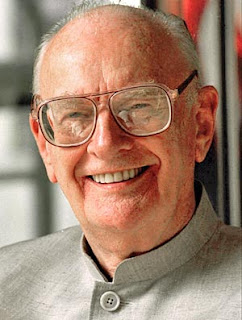
Arthur C. Clarke, one of the last of the great SF writers who came of age in the 1950's, has died. Clarke was in his lifetime one of the few SF writers familiar to the general public, joining a select group that included Issac Asimov, Robert Heinlein, Philip Dick and (still among the living) Ray Bradbury.
Clarke was more than an SF writer, however. He was a man interested in the real future of mankind, and his thought anticipated and inspired many technical developments. He helped develop the concept of geosynchronous satellites, and the geostationary orbit he first described in a 1945 article is now described as a 'Clarke orbit.' Clarke also described the concept of a space elevator back in 1979 and believed that this would actually end up being of greater significance than geosynchronous satellites.
Clarke wrote rather interesting non-fiction books and articles, some for juveniles, that focused on science, particularly space flight. His TV programs, such as Arthur C. Clarke's Mysterious World, reflected an interest in looking at paranormal claims and other pseudoscience. Clarke completely rejected formal religion, yet he retained an interest in religion's impact on modern life, and in stories like 'The Nine Million Names of God' and 'The Star' reflected rather poignantly on how ever-expanding knowledge of the universe as it is leads to a recognition of the limits of traditional religion, which Clarke felt was a immature stage of human development.
I'm actually going to post this in a few places, so forgive me if you see this more than once.
I think, rather than talk about the impact that Clarke had on the world or myself, which is substantial, I'll let Clarke speak for himself. Here's a link to a video that Clarke released just weeks ago on the occasion of his 90th birthday. Enjoy.
3/19/2008
CLARKE SPEAKS
Subscribe to:
Post Comments (Atom)




No comments:
Post a Comment